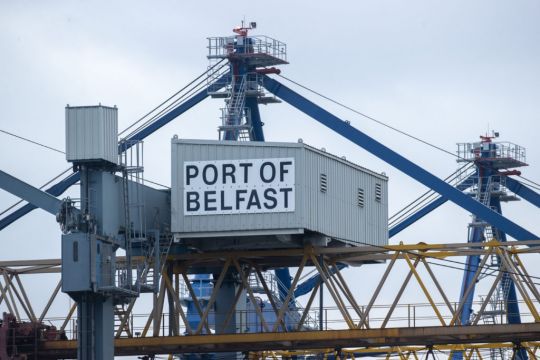Customs officials will take a “light touch” approach to checking goods being transported from Britain to Northern Ireland when the Brexit transition ends, UK MPs have been told
A senior UK Revenue & Customs (HMRC) official told a UK parliament committee such checks would be kept to a minimum and suggested there would be no increase from a current monitoring rate of between 1 and 2 per cent.
Aidan Reilly, director for customs and border design at HMRC, told members of the Northern Ireland Affairs Committee: “We will be keeping customs checks to the minimum necessary to police the regime.
“We will want to make the regime appropriate for the circumstances in which it’s operating, which is obviously within the overall UK customs territory, and obviously HMRC is administering both sides of these transactions, so we’ll be able to access data that would not ordinarily be the case for cross-border movements.
“So we will do a lot to police it as appropriately and as light touch as possible.”
While the North will remain part of the UK customs territory post-Brexit, the region will still administer the EU’s customs code at its ports. This will require declaration on goods moving from Britain into Northern Ireland.
Committee member and DUP North Antrim MP Ian Paisley Jr had asked whether traders would expect to see an increase in the current 1-2 per cent rate of checking goods.
Mr Reilly said he did not expect to see that percentage increase.
“That’s very reassuring and probably something traders will welcome that they won’t actually see much of a difference,” said Mr Paisley.
Mr Reilly said he anticipated 11 million declarations a year on goods moving from Britain into Northern Ireland.
Alliance MP Stephen Farry suggested that number appeared low and highlighted that the UK government’s Trader Support Scheme had estimated 30 million.
The official acknowledged the figure was “uncertain”, explaining that very little HMRC data existed on movements between Great Britain and Northern Ireland due to the fact that custom declarations were not required previously.
“The number is a very uncertain number,” he said.
“It’s not a data flow we have previously captured any data on. So the number of traders, the number of movements, what will happen, and whether trader behaviour will change, and you might start to kind of load significantly larger loads, means that is the best estimate of the number that we have got at the moment but, as I say, that is highly uncertain.”
Mark Denney, the HMRC’s director of IT for managing the EU exit, said systems for declarations would be ready by the end of the transition period at the end of December.
“We have a number of core systems that we’ve been developing for the previous two years and our delivery track at the moment is to have all of those core delivery components delivered for the 1st of January,” he told the committee.
“So at the moment, we’ve got a very busy December coming, where we’ve got a lot of testing to finish off. We’re getting ready for deployment and implementation. But we fully expect to have a broadly functioning model available for the 1st of January.”
The joint UK/EU committee working out the operation of the protocol are at loggerheads on what goods entering Northern Ireland from Britain are categorised “at risk” of onward transportation to the Republic and, as such, would be liable for tariffs.
If the UK and EU were to strike a zero tariff/zero quota trade deal then the need to determine “at risk” products would no longer be required.

The customs aspect of the Northern Ireland Protocol is separate from the Single Market dimension which will require increased regulatory checks on animal-based products entering from Great Britain, regardless of whether a broader trade deal is agreed.
During today’s evidence session, Mr Reilly also sought to reassure MPs that issues around the compatibility of the EU and UK’s respective IT systems were being addressed.
“We’ve done a series of performance testing on the various systems with the (European) Commission, all of which have worked appropriately,” he said.
“And my understanding from the conversation with the Commission is they are very satisfied with the HMRC systems and the sharing data etc will work with the Commission’s systems.”







